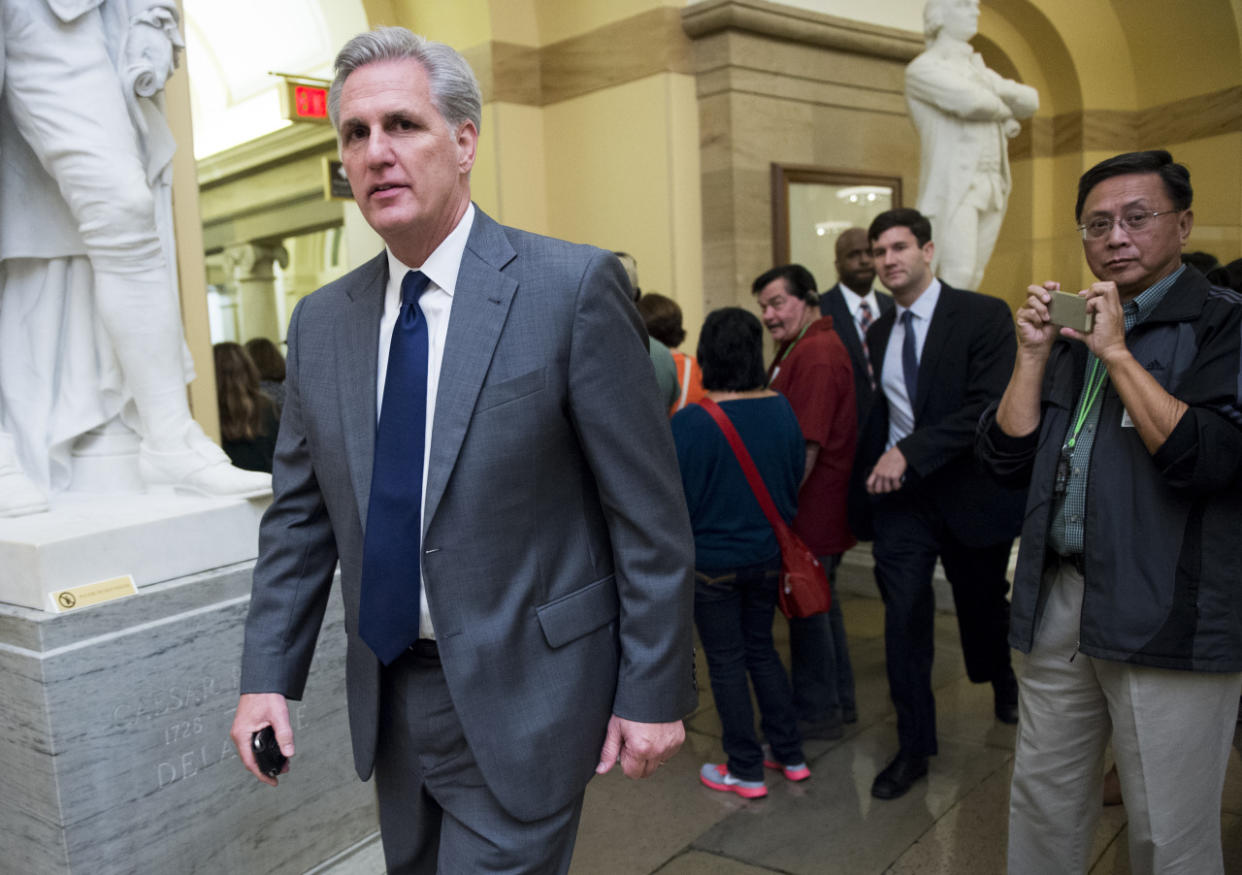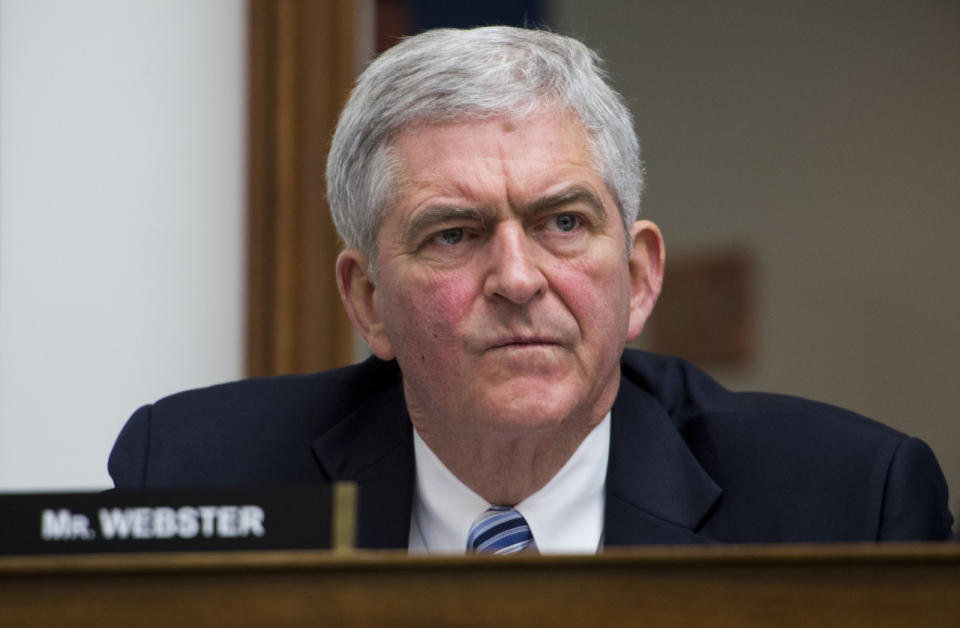Republican battle to pick next speaker is just beginning

House Majority Leader Kevin McCarthy, R-Calif., is hoping to be the next speaker, but the process isn’t easy and Republicans are divided on their party’s future. (Photo: Bill Clark/CQ Roll Call)
For House Republicans, the internal machinations to replace Speaker John Boehner, now taking place mostly behind closed doors, are about to spill into the open, with all the party’s divisions and rancor exposed to public view.
On Thursday, House GOP members will meet for a closed-door session that originally scheduled to elect the rest of their leadership slate — the No. 2 through 4 positions in the party. But earlier this week, that plan shifted, and now the purpose of the meeting will be to choose a nominee for speaker, with the full, official House election set for Oct. 29. The vote on the other positions — majority leader, whip and conference chair — won’t happen until November.
Hard-right conservatives in the GOP have long been pushing not just for a change at the top of their conference, but in how the party goes about selecting its leaders. The shift in schedule, in conjunction with the preliminary non-binding vote for speaker on Thursday, marks a modest concession to that rebellious faction.
But the danger for Republicans — and this has served as a check on the anti-Boehner faction for years — is that whoever wins the majority of votes on the House floor in a speaker election wins the gavel. That means if no one Republican, like the favored Boehner successor Kevin McCarthy of California, can consolidate enough votes, Democratic Minority Leader Nancy Pelosi of California would become speaker.
For context, Boehner won his most recent speaker’s gavel in January 2015 with 216 votes (out of 408 cast) to Pelosi’s 164. A surprisingly large number of Republicans — 25 — voted for other candidates.
In the upcoming contest, Republicans Jason Chaffetz of Utah and Daniel Webster of Florida (who received 12 votes in January) have already announced they’re running against McCarthy.
Of course, a lot would have to go wrong for Republicans for Pelosi to win the top job in a chamber over which her party does not wield the majority, a dynamic that has never happened in the modern era. But it will also be extraordinarily difficult for the 40 or so members in the far right of the party — who have organized themselves into a group known as the Freedom Caucus — to put forward a candidate who could win the majority of House members.
But they can wreak havoc along the way, and by voting as a bloc for Webster, which they vowed to do on Wednesday, they would make McCarthy’s path to the majority — 218 members of the full House — much more difficult.

A large bloc of House conservatives have already backed an insurgent McCarthy challenger, Rep. Daniel Webster of Florida, for speaker. (Photo: Bill Clark/CQ Roll Call via Getty Images)
For now, at least, Democrats are having some fun with the GOP turmoil: “Clearly, with Pelosi’s name on the ballot, she’ll get the overwhelming majority of all Democrats, I’m sure,” No. 2 House Democrat Steny Hoyer told reporters Tuesday. “She’s indicated that’s what she wants to do. Republicans are going to have to decide on their side what they’re going to do.”
Though Hoyer said Republicans “have to decide this on their own,” he added that Democratic leaders are watching what’s happening with interest.
And House Democrats are not without a back-and-forth history of both bailing out Republicans leaders and messing with them on the floor.
Although Democrats have, as recently as last week, given Boehner the votes he needed to avoid a government shutdown, they also have used parliamentary maneuvers to make his life difficult.
In 2011, at the beginning of their run as the majority party, Republican leaders brought multiple budgets to the House floor, expecting that the one favored by the GOP establishment would pass easily. But in a surprise move, Democrats voted “present” en masse on a more conservative framework authored by Rep. Jim Jordan, R-Ohio, now co-chair of the Freedom Caucus. The chaotic result was that Republicans suddenly had to decide whether to defeat the radical conservative budget on their own. And the Jordan budget almost passed, which would have given the Democrats a handy issue to run on in the next election, without having to actually cast a vote in favor of it themselves.
Which is to say, just because Democrats don’t have any current plans to get involved doesn’t mean they couldn’t — although speculation to date has centered around whether Democrats would agree to bail McCarthy out in the event he can’t hit his magic number of 218. If Democrats were to do so, it likely would hurt McCarthy with his party’s right wing from day one of his speakership.
Meanwhile, as scheduled, the speaker vote will happen after the next GOP presidential debate, giving some of the most conservative and visible firebrands in the race the chance to lend their voices to the congressional cacophony.
Another wrinkle — though much less significant, given that it’s never happened before — is that the speaker doesn’t necessarily have to be a member of the House, meaning members on the floor could literally vote for anyone who meets the same bare-bones constitutional qualifications of any House member. For example, in January, Sen. Rand Paul of Kentucky, a current presidential contender, and Sen. Jeff Sessions of Alabama, both received one vote, as did former Secretary of State Colin Powell.
Moreover, the leadership election is complicated by the fact that Congress will have to find a way to extend the government’s debt limit by early November, and to fund the government again by December. Agreeing to both of those basic functions of government were at the heart of why Boehner was forced out in the first place. Whoever succeeds him won’t have a much easier time balancing the responsibilities of governing and the faction of the Republican Party largely opposed to government.

